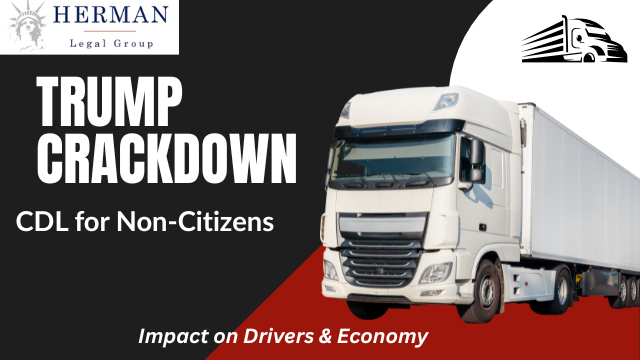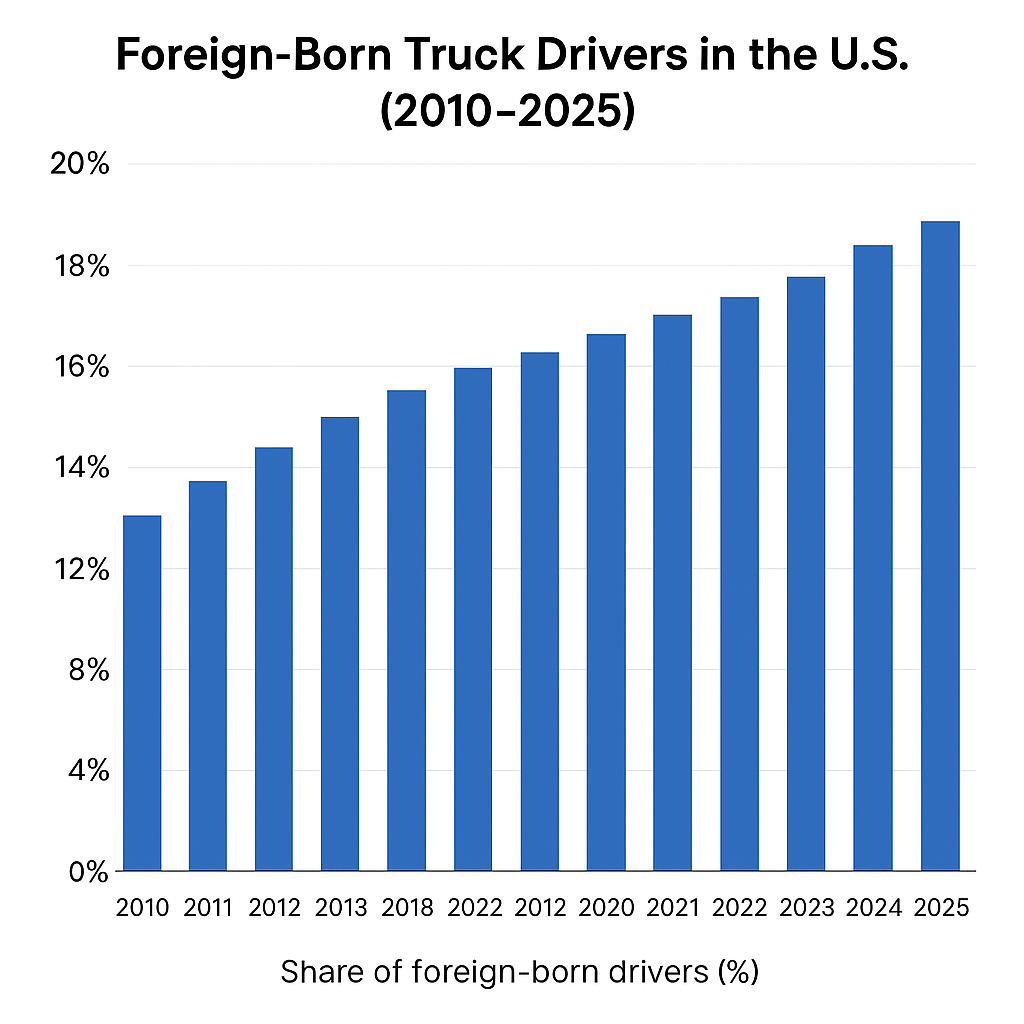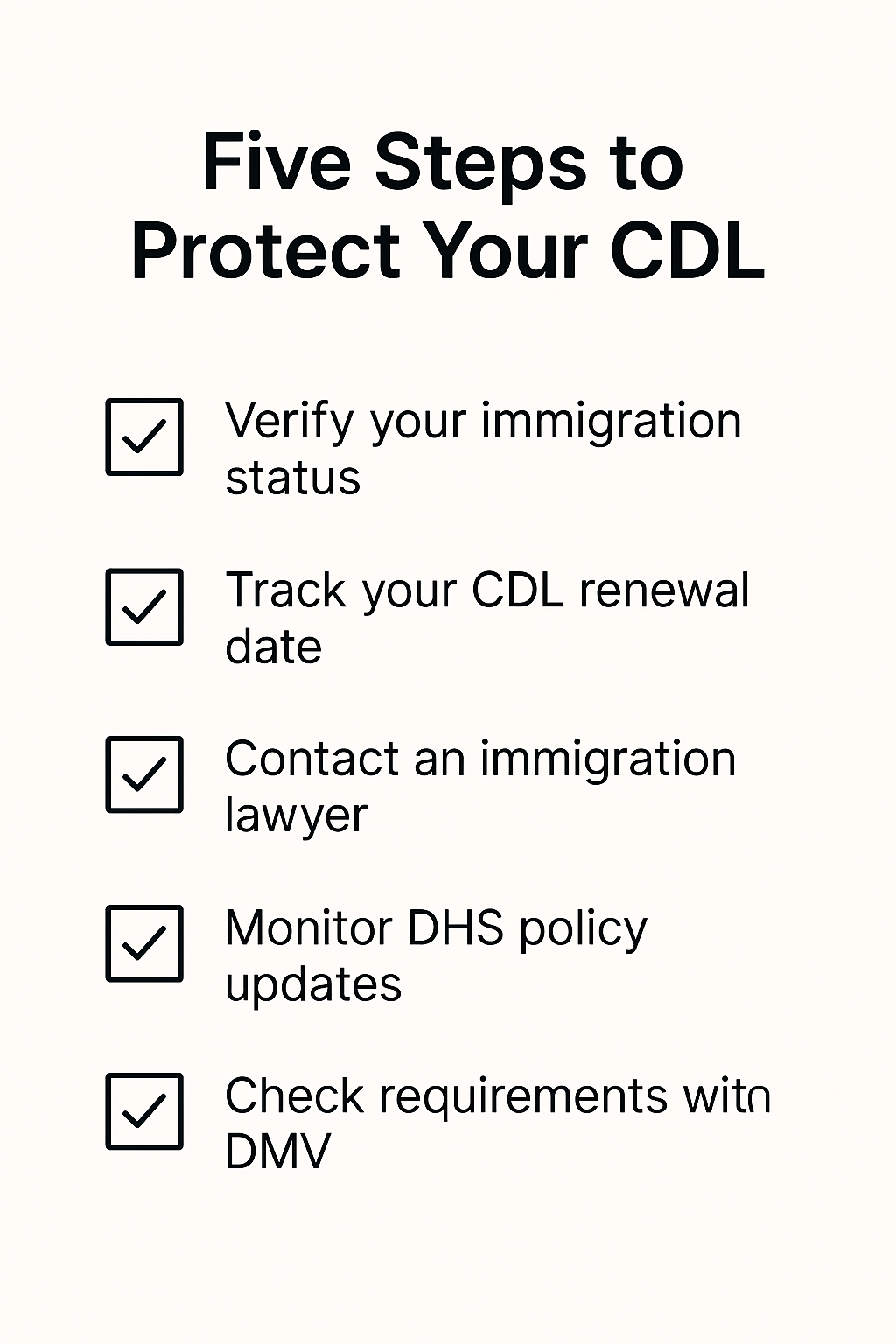Immigration Lawyer Richard Herman: “New Trump-era policies could bar thousands of immigrant and foreign-born truck drivers from obtaining or renewing their commercial driver’s licenses, reshaping the U.S. trucking industry.”
The U.S. trucking industry is facing another seismic shift under the Trump administration’s 2025 transportation and immigration agenda. A sweeping new initiative from the Department of Transportation (DOT) and Department of Homeland Security (DHS) aims to tighten verification procedures for who can obtain or renew a commercial driver’s license (CDL).
At the center of the controversy: foreign truck drivers who have long been essential to the American supply chain. The Trump trucking license crackdown seeks to align transportation licensing rules with immigration enforcement priorities — a move that could impact tens of thousands of legally present immigrant workers.

What’s Behind the Trump Administration’s New Trucking License Crackdown?
The 2025 CDL verification rule links federal immigration databases to state licensing systems, requiring proof of lawful status for all applicants.
The policy, issued jointly by the Federal Motor Carrier Safety Administration (FMCSA) and DHS, directs all U.S. states to verify applicants’ citizenship or immigration status through federal databases such as SAVE (Systematic Alien Verification for Entitlements). Transportation Secretary Sean Duffy announced that a Federal Motor Carrier Safety Administration audit uncovered systemic failures in how multiple states issue non-domiciled CDLs.
The department uncovered that many licenses were allegedly issued improperly, including to ineligible applicants. The audit revealed that weak oversight by state agencies contributed to these violations. The Department of Transportation has declared a national emergency over states’ handling of commercial driver licenses for noncitizens.
The FMCSA’s ongoing audit is focused on state licensing practices for commercial drivers, examining compliance and enforcement. This ongoing audit aims to ensure that state licensing practices meet federal standards and address safety concerns.
Under the new coordination framework, state licensing agencies must:
- Confirm lawful immigration status before issuing or renewing CDLs.
- Deny or revoke CDLs for drivers whose lawful status has expired.
- Report inconsistencies or mismatches directly to DHS.
This policy aligns with Trump’s broader “America First Transportation” platform, which promises to “protect American jobs and highways from illegal labor participation.” The administration cites security concerns and alleged fraud in state licensing programs that previously allowed undocumented immigrants or temporary visa holders to drive commercially. Transportation Secretary Sean Duffy stated that the licensing process has become a threat to public safety and is broken.
The federal government has threatened to hold states accountable for noncompliance, including the possibility of withholding federal funding.
However, critics argue the crackdown targets the very workers keeping goods moving amid a chronic trucking labor shortage — a workforce heavily composed of immigrant truck drivers. The reduction in the number of drivers due to these regulations could worsen the existing shortage of commercial truck drivers by potentially over 100,000.
How Do the New CDL Restrictions Affect Foreign Drivers?
Lawyer Richard T. Herman: “States must now use DHS databases like SAVE and E-Verify before approving any CDL application, delaying or denying licenses for many immigrant drivers.”
Under the updated framework, every state must cross-check an applicant’s information against DHS and Social Security Administration records. All states must immediately pause the issuance of non-domiciled CDLs until they can comply with new federal rules. The Transportation Department discovered that 25% of the Golden State’s non-domiciled CDLs reviewed were issued in violation of federal rules, highlighting California’s reckless disregard for federal regulations in the CDL issuance process. California Gov Gavin Newsom and his administration have faced criticism for their lack of immediate action in response to these findings.
The audit found the Golden State faced the harshest consequences, with 25% of its non-domiciled CDLs found in violation of federal rules. As a result, the federal government could pull millions in federal highway funds from California if it does not comply, and the state stands to lose federal funding entirely. Duffy urged California to take immediate corrective action to avoid these penalties. Duffy added that continued noncompliance would result in the loss of critical transportation resources for the state.
The Transportation Department gave California 30 days to come into compliance with new regulations or risk losing $160 million in federal funding.
Here’s how it works:
- Verification: The applicant’s immigration or citizenship information is sent to DHS SAVE to confirm that all eligibility requirements are met for obtaining a commercial driver’s license under the new policy.
- Pending Statuses: If the system cannot verify status — for example, if an applicant’s work authorization or visa extension is pending — the CDL cannot be issued or renewed. The new rules impose a stricter set of standards for non-domiciled CDL applicants, including mandatory documentation and status checks.
- Revocations: States must revoke previously issued CDLs if lawful presence later expires or becomes invalid. Under the new rules, a limited term CDL will be issued to noncitizens, and these licenses will only be valid for up to one year unless the applicant’s visa expires sooner than that. Eligibility for a non-domiciled CDL is now tied to having an employment based visa, and only three specific classes of visa holders will be eligible for a non-domiciled CDL under the new rules.
Affected groups include:
- H-2B temporary visa holders working in seasonal transport.
- TN and H-1B professionals whose CDL supports job mobility.
- F-1 students on OPT driving for logistics companies.
- Green card applicants awaiting adjustment of status.
Even lawful permanent residents may face bureaucratic hurdles if database mismatches occur — a known issue in previous immigration-status verification systems.
Which Drivers Are Most at Risk Under the New Policy?
Immigration Attorney Richard T. Herman: “Tens of thousands of legally present foreign truck drivers may lose or be denied CDLs as states tighten immigration status checks.”
The Trump trucking license crackdown primarily impacts three categories of drivers:
- Visa Holders in Transition:Non-immigrant workers awaiting extensions or changes of status may be flagged as “unverified” due to system delays.
- DACA Recipients:States that previously issued CDLs under Deferred Action for Childhood Arrivals protections must now revoke or decline renewals for drivers without active work permits.
- Undocumented Workers with State Licenses:Roughly 19 states allowed undocumented residents to obtain non-REAL ID compliant licenses. Under federal pressure, those programs may be defunded or invalidated.
Oversight lapses have allowed some drivers to obtain their licenses times illegally, increasing the risk of unqualified individuals on the road. When a state fails to properly regulate CDL issuance, it further raises the likelihood of unsafe foreign drivers and dangerous foreign drivers operating large trucks without proper authorization. The new policy is specifically designed to prevent unsafe foreign drivers from obtaining or renewing CDLs, aiming to address these systemic safety risks.
This shift means that thousands of immigrant truckers who have legally paid taxes, maintained clean driving records, and filled vital transport roles may suddenly be sidelined — not for safety, but for bureaucratic technicalities tied to immigration databases.
Impact on America’s Trucking Industry and Supply Chain
Experts warn that CDL restrictions could worsen driver shortages, delay deliveries, and raise consumer prices across the U.S.
Freight transportation expertise is crucial for maintaining efficient logistics and supply chain operations, and disruptions in this sector can have widespread effects on the industry.
The American Trucking Associations (ATA) estimates that the industry currently faces a shortage of over 80,000 drivers — a gap projected to widen to 160,000 by 2030. According to FMCSA data, foreign-born drivers make up nearly 18% of the U.S. trucking workforce. The American Trucking Associations supports the new actions taken by the Transportation Department to ensure compliance and safety.
Key economic impacts include:
- Delivery Delays: Reduced workforce capacity may strain national logistics, especially during holiday and harvest seasons.
- Inflationary Pressure: Transportation costs often translate directly into retail price hikes.
- Small Business Closures: Independent trucking companies that rely on immigrant labor may struggle to maintain operations.
“Share of Foreign-Born Drivers in U.S. Trucking (2010–2025)” — showing steady growth from 11% to nearly 18%.
Industry analysts warn that if the Trump CDL immigration restrictions take full effect without a transitional period, the ripple effect on consumer goods, food supply, and manufacturing logistics could rival the pandemic-era bottlenecks.

Employer Reactions: Trucking Companies Brace for Disruptions
Trucking companies warn that mandatory immigration checks could destabilize logistics networks and slow down hiring pipelines. Many employers are bracing for major changes in their hiring and compliance procedures as a result of these new regulations. The Transportation Department is making major reforms to the CDL verification process, which will impact the entire industry.
The American Trucking Associations, Owner-Operator Independent Drivers Association, and National Association of Small Trucking Companies have publicly raised concerns.
Top employer worries include:
- Compliance Costs: Smaller fleets lack staff to manage SAVE or E-Verify documentation.
- Recruitment Bottlenecks: Hiring cycles could lengthen by months.
- Legal Exposure: Employers may face penalties for inadvertent data mismatches or delayed verification.
Some industry coalitions are urging the DOT to delay implementation until a uniform national system is built, warning that “piecemeal enforcement will create chaos at the state level.”
Major logistics firms are reportedly exploring automation or foreign outsourcing to mitigate anticipated workforce losses — a move critics say contradicts the policy’s goal of protecting U.S. jobs.
Legal and Constitutional Challenges
Civil rights groups are preparing lawsuits alleging discrimination and federal overreach in the new CDL verification system.
Civil liberties organizations, including the ACLU and National Immigration Law Center, are drafting legal challenges that could mirror past cases over driver’s license denials.
Key legal issues:
- Federal Preemption: States may argue that immigration enforcement is a federal, not state, responsibility.
- Equal Protection: Plaintiffs could allege discrimination against immigrants lawfully present in the U.S.
- Administrative Procedure Act (APA): Critics claim DOT and DHS bypassed standard notice-and-comment rulemaking procedures.
Meanwhile, state attorneys general in California, New York, and Illinois have signaled potential opposition, citing economic harm to their transportation industries.
Historical Context — How Past Policies Set the Stage
The 2025 CDL policy builds on Trump’s earlier transportation security measures from 2017–2020, reversing Biden-era leniencies.
Between 2017 and 2020, the Trump administration emphasized immigration-linked security protocols across multiple sectors, including aviation, border patrol, and infrastructure. Fatal crashes involving truck drivers who should not have had licenses were reported in Florida, Texas, and Alabama. These deadly crashes resulted in numerous traffic deaths, highlighting the dangers posed by improperly licensed and unauthorized drivers.
In one high-profile case, a truck driver was charged with three counts of vehicular homicide after making an unauthorized U-turn that led to a fatal accident. Body camera video shows law enforcement officers conducting traffic stops, including incidents where Singh holding paperwork was documented as part of a compliance check. In another example, a driver received a speeding ticket during a routine stop, further illustrating the risks of insufficient training and unauthorized u driving. Without reforms, experts warn that more traffic deaths are likely as a result of ongoing regulatory failures.
Key milestones included:
- 2018: Implementation of enhanced REAL ID standards via DHS REAL ID Program.
- 2019: FMCSA proposal to expand data sharing between states and federal immigration databases.
- 2020: Pilot programs linking commercial transport background checks with DHS systems.
The Biden administration temporarily paused these efforts, expanding driver’s license access for DACA recipients and other lawful residents. But the 2025 Trump policy revives and centralizes these enforcement efforts under a new umbrella: the National CDL Status Verification Initiative. The English Language Proficiency (ELP) mandate, in effect since June 25, 2025, restricts commercial drivers who cannot meet federal English language standards.
Voices from the Road — Immigrant Drivers Speak Out
Many immigrant truckers see the new CDL rules as an attack on their livelihoods rather than a measure to protect national security.
Interviews from driver advocacy networks such as Truckers Movement for Justice and Teamsters highlight growing anxiety among immigrant workers.
“I’ve driven coast-to-coast for 15 years, paid my taxes, and never had a violation,” says Rajiv Singh, an Indian-born trucker based in Ohio. “Now I might lose my license because my green card renewal is stuck in processing.”
Stories like Singh’s illustrate the human cost of the Trump trucking license crackdown. Many drivers who played crucial roles during the pandemic now feel abandoned.
Some immigrant-led trucking cooperatives are lobbying Congress for legislative fixes — such as grace periods or provisional CDL renewals — for drivers with pending immigration cases.
What Should Immigrant Truck Drivers Do Now?
Foreign truck drivers should verify their immigration status, monitor CDL renewal dates, and consult experienced immigration counsel before renewal.
Immigrant truckers affected by these policies can take several steps to protect their careers:
Checklist: “Five Steps to Protect Your CDL”
- Verify Legal Status: Use the USCIS Case Status portal to confirm current visa or green card progress.
- Check State DMV Rules: Consult your state’s Department of Motor Vehicles for updates on CDL requirements.
- Update Work Authorization: Renew or extend Employment Authorization Documents (EADs) before license expiration.
- Document Everything: Keep copies of receipts, NOAs, and SAVE verification records.
- Seek Legal Guidance: Contact an experienced immigration lawyer for strategic assistance.

For Employers:
- Conduct proactive audits of employee eligibility records.
- Coordinate with legal counsel on SAVE and E-Verify compliance.
- Avoid discriminatory practices during verification processes.
These steps can help minimize disruption as states implement the DHS trucking policy over the coming months.

Policy Outlook — What Comes Next for the Trucking Workforce?
Analysts predict court battles, state resistance, and calls for bipartisan reform to address the immigrant driver shortage.
Over the next year, litigation could delay full enforcement, especially in states that depend heavily on immigrant labor for freight and agriculture. The Congressional Research Service warns that disruptions in the trucking sector could have “significant macroeconomic implications.”
Recently, FMCSA discovered noncompliance during its audit, revealing violations in licensing practices and prompting the current crackdown. In response, the Trump admin cracks down on illegal licensing practices, targeting unqualified and foreign truckers as part of its broader regulatory efforts. The trump admin continues to push for stricter trucking and immigration enforcement policies, citing national security and public safety concerns.
Policy experts anticipate several possible outcomes:
- Legal Delays: Federal courts may issue temporary injunctions.
- State Rebellion: States like California could enact alternative verification systems to protect local drivers.
- Legislative Fixes: Congress might consider targeted visa programs for essential drivers, similar to agricultural worker visas.
“The fight over immigrant truckers may define how America balances border control with supply-chain security,” says a former FMCSA official.
The broader debate will test whether immigration enforcement and economic stability can coexist in a post-pandemic economy increasingly reliant on global labor.
Conclusion — America’s Road Ahead
**Richard Herman, Immigration Law Expert: “**The 2025 trucking license crackdown highlights a deeper tension between border control and America’s economic dependence on immigrant labor.”
As the Trump administration moves forward with CDL verification mandates, the nation’s highways may soon mirror its immigration divide: fewer immigrant drivers, higher delivery costs, and intensified political debate over who keeps America moving. Critics argue that the issuance of licenses to unauthorized drivers represents a direct threat to public safety, citing the potential for deadly accidents and calling for urgent regulatory action. Some have even described California’s oversight as ‘frankly disgusting,’ pointing to what they see as a severe and morally repugnant failure that undermines trust in licensing authorities.
Balancing immigration integrity with economic reality will require creative policymaking. Solutions could include:
- Expanding driver visa categories.
- Streamlining SAVE verification timelines.
- Allowing grace periods for renewals pending lawful status.
Ultimately, the future of America’s trucking industry depends not only on regulations, but on recognizing that immigrant workers remain indispensable to the nation’s economy. Transportation officials are confident that the removal of illegal non-domiciled CDL holders will not disrupt the U.S. supply chain.
Frequently Asked Questions: Trump’s Crackdown on Trucking Licenses for Foreign Nationals (2025)
What is Trump’s trucking license crackdown?
The 2025 policy links immigration status verification with state-issued commercial driver’s licenses. Under new coordination between the Department of Transportation (DOT) and the Department of Homeland Security (DHS), states must confirm lawful presence through federal databases before issuing or renewing a CDL.
When did this policy take effect?
The initiative was rolled out in mid-2025 following a joint rule published by the Federal Motor Carrier Safety Administration (FMCSA) and DHS. States are required to fully comply by early 2026, though some have begun implementation ahead of schedule.
Who is affected by the CDL crackdown?
The rule affects all non-U.S. citizens applying for or renewing a CDL, including lawful permanent residents, visa holders (H-2B, TN, H-1B, F-1 OPT), DACA recipients, and undocumented workers who previously held state-level licenses.
Why did the Trump administration implement this policy?
Officials claim the crackdown aims to prevent identity fraud, improve national security, and ensure only lawful residents operate commercial vehicles. Critics argue it’s part of Trump’s broader immigration enforcement agenda designed to reduce foreign participation in U.S. industries.
How will states verify immigration status?
State licensing agencies must use DHS’s SAVE (Systematic Alien Verification for Entitlements) system and cross-check information with the Social Security Administration and FMCSA’s registry. If a driver’s immigration status cannot be verified, the CDL must be denied or revoked.
Can someone with a pending green card or visa renewal apply for a CDL?
In most cases, pending applications or temporary receipts are not sufficient for CDL issuance. Only drivers with confirmed lawful presence in DHS databases will qualify, leading to potential denials even for individuals lawfully in the U.S. awaiting approval.
Will DACA recipients lose their CDLs?
Yes, in states previously issuing CDLs or commercial learner’s permits (CLPs) to DACA recipients, those licenses are now subject to revocation unless the individual holds an active Employment Authorization Document (EAD).
Does this policy affect undocumented workers with state driving privileges?
Yes. While some states previously issued standard (non-commercial) licenses to undocumented residents, the federal rule overrides those programs for CDLs. Undocumented drivers can no longer obtain or renew commercial licenses used for interstate commerce.
How does the crackdown affect the trucking labor market?
Industry analysts warn that stricter licensing requirements could worsen the U.S. trucking labor shortage, which already exceeds 80,000 drivers. Immigrant truckers make up nearly 18% of the national workforce, and mass disqualifications may cause supply chain delays and higher consumer prices.
What are the economic consequences of this rule?
Reduced driver availability may increase shipping costs, slow product delivery times, and contribute to inflation in key sectors such as retail, agriculture, and construction. Small trucking companies that rely on immigrant labor face disproportionate disruption.
What happens if a driver’s status changes after license issuance?
States must revoke or suspend the CDL if DHS later determines that the driver’s lawful status has expired or become invalid. Employers are encouraged to run regular checks through E-Verify to remain compliant.
Can states refuse to comply with this federal mandate?
While states have discretion in how they administer CDLs, federal law ties compliance to highway safety funding. Refusal to follow the verification rules could result in loss of federal transportation grants, making full participation almost unavoidable.
Are there exceptions for humanitarian or temporary statuses?
The rule provides limited flexibility for asylees, refugees, and individuals with Temporary Protected Status (TPS). However, delays in federal database updates often lead to inadvertent denials even for protected individuals.
What legal challenges have been filed against the CDL restrictions?
Civil rights groups, including the ACLU and National Immigration Law Center, are preparing lawsuits claiming the rule violates equal protection, discriminates based on national origin, and exceeds the administrative authority of FMCSA and DHS under the Administrative Procedure Act (APA).
Could the policy be overturned by courts?
It’s possible. If federal courts find procedural flaws or discrimination in implementation, they may block or delay enforcement. States with high immigrant driver populations, such as California and New York, are likely to lead such legal efforts.
How does this differ from previous federal policies?
Under the Biden administration, several states expanded access to licenses regardless of immigration status. The 2025 Trump policy reverses those changes, reinstating mandatory lawful-status checks and expanding federal control over CDL eligibility.
How will this policy impact supply chains?
Reduced driver availability may create logistical bottlenecks similar to those seen during the pandemic. Agricultural and freight companies are particularly vulnerable, as they depend on immigrant labor for cross-country transport.
What steps should foreign drivers take now?
Foreign drivers should:
- Verify their immigration status with USCIS.
- Monitor state DMV announcements for compliance deadlines.
- Renew their Employment Authorization Document (EAD) before expiration.
- Retain all USCIS receipts and SAVE verification records.
- Consult an immigration attorney for personalized guidance.
How should employers prepare for the rule?
Trucking companies should update hiring and verification procedures, audit existing driver records, train HR teams on SAVE and E-Verify processes, and work with counsel to avoid discriminatory practices during compliance checks.
Are there any legislative solutions being discussed?
Some members of Congress have proposed creating a “critical infrastructure visa” for essential transport workers or granting provisional licenses for drivers with pending lawful status. However, as of late 2025, no such measure has been enacted. The bill aims to grant the U.S. Virgin Islands and Puerto Rico eligibility to issue commercial driver’s licenses.
What are advocacy groups recommending?
Driver unions and advocacy organizations urge federal agencies to provide grace periods, appeal mechanisms, and real-time SAVE database updates to prevent wrongful disqualifications. They also call for transparency and oversight in how state agencies implement verification rules.
Could this lead to wider enforcement in other industries?
Yes. The CDL crackdown could serve as a model for future immigration-linked licensing rules affecting other federally regulated industries such as aviation, maritime shipping, and public safety.
What can immigrants do if their license is revoked due to status verification errors?
Affected drivers can file a SAVE verification appeal through their state DMV or contact DHS to correct records. Legal counsel can assist with expedited status verification or reapplication once lawful status is restored.
Will this policy affect consumer prices and delivery times?
Yes. Reduced driver capacity increases transportation costs, which typically result in higher consumer prices for goods, groceries, and building materials. Delivery delays are also expected to increase during peak shipping periods.
Does this policy apply equally to all states?
Yes, all 50 states and U.S. territories that issue CDLs are required to integrate DHS verification. However, enforcement intensity and processing delays will vary based on local infrastructure and cooperation with federal agencies.
What is the overall goal of the policy according to the Trump administration?
The administration argues that the policy enhances highway security, prevents fraud, and ensures that only individuals with lawful status operate commercial vehicles. Supporters frame it as a “law and order” reform; opponents see it as targeted immigration enforcement.
What’s next for immigrant truck drivers and their employers?
Legal, political, and administrative challenges will continue into 2026. In the meantime, affected workers and companies should maintain accurate records, monitor DHS updates, and seek legal guidance to stay compliant as states phase in the new requirements.
Need Case-Specific Guidance?
For drivers and employers navigating renewals, SAVE mismatches, or EAD timing, book a consult with Herman Legal Group for tailored compliance and litigation strategy.
Call to Action: Protect Your CDL, Your Rights, and Your Future
If you’re an immigrant truck driver, commercial carrier, or business owner affected—or worried you might soon be affected—by Trump’s crackdown on trucking licenses for foreign nationals, now is the time to act.
The new CDL verification rules link immigration databases directly to state licensing systems. That means a delay or mismatch in your immigration status could cost you your license, your livelihood, and your ability to work legally in the United States.
This isn’t just policy—it’s personal. Thousands of immigrant truck drivers who helped keep America moving through the pandemic now face uncertainty over renewals, lawful presence checks, and SAVE system errors. The stakes couldn’t be higher.
Why Contact Attorney Richard T. Herman?
For over 30 years, Attorney Richard T. Herman has stood on the front lines defending the rights of immigrants, essential workers, and their families.
He is a nationally recognized immigration lawyer, co-author of the book Immigrant, Inc., and a passionate evangelist for the economic and community benefits of welcoming immigrants into America’s workforce.
Richard and his firm, Herman Legal Group, represent clients nationwide in complex immigration, employment, and status-based licensing matters—including SAVE verification appeals, I-9 compliance, DACA renewals, and lawful presence disputes tied to CDL restrictions.
What You’ll Gain From a Consultation
When you contact Herman Legal Group, you’ll receive:
- Personalized Legal Guidance – Understand how new CDL and immigration rules apply to your case.
- Strategic Solutions – Protect your CDL or prepare a defense if your license is delayed or revoked.
- Document Review & SAVE Appeals – Fix verification errors that can lead to wrongful license denials.
- Employer Compliance Support – Guidance for trucking companies navigating E-Verify and hiring rules.
- Peace of Mind – Direct representation from a firm that believes immigrants are the backbone of America’s economy.
Don’t Wait — Act Before It’s Too Late
Every day of delay increases the risk of license expiration or loss of employment authorization.
Your CDL is more than a card—it’s your livelihood, your independence, and your contribution to America’s supply chain.
Contact Herman Legal Group today to protect your rights and your career under the new CDL enforcement climate.
Schedule your consultation now:
👉 Book a Consultation with Herman Legal Group
Or visit LawFirm4Immigrants.com to learn how Attorney Richard T. Herman can help you stay on the road—and keep America moving.
Herman Legal Group — The Law Firm for Immigrants.
Serving clients nationwide. Available via Zoom, WhatsApp, Skype, or in-person consultations.
Authoritative Federal Government Resources
Transportation & Safety (DOT / FMCSA)
- U.S. Department of Transportation (DOT) — department-wide policy statements, press releases, guidance.
- Federal Motor Carrier Safety Administration (FMCSA) — CDL standards, Safety Regulations, and enforcement.
- FMCSA Registration & Licensing — carrier and driver registration resources.
- FMCSA Rules & Regulations — parts 383/384 (CDL standards & state compliance).
- FMCSA Data & Analysis (Analysis & Information Online) — compliance, crash, and safety datasets.
Homeland Security & Immigration Status (DHS / USCIS / CBP)
- U.S. Department of Homeland Security (DHS) — policy announcements and homeland security directives.
- U.S. Citizenship and Immigration Services (USCIS) — immigration benefits, EADs, lawful presence.
- USCIS Case Status Online — check pending status that can affect CDL renewals.
- DHS SAVE Program — Systematic Alien Verification for Entitlements used by states to verify lawful status.
- E-Verify — employment authorization verification; employer compliance updates.
- U.S. Customs and Border Protection (CBP) — admission records, I-94 info relevant to proof of status.
Identity, REAL ID, and SSA
- REAL ID (DHS) — identity standards intersecting with licensing.
- Social Security Administration (SSA) — SSN verification and mismatch resources for agencies.
Rulemaking, Federal Notices, and Research
- Federal Register — official rulemaking docket (search FMCSA/DHS CDL verification).
- Regulations.gov — comment portals, dockets, and supporting analyses.
- Congressional Research Service (CRS) Reports — neutral, in-depth policy overviews.
Labor Market & Economic Data
- Bureau of Labor Statistics (BLS) – Truck Drivers — wages and employment.
- BLS – Employment Projections — long-run labor outlook, driver shortages.
State-Level Implementation & Guidance
- USA.gov – State Motor Vehicle Services Directory — one-click access to all state DMVs for CDL rules, renewal checklists, and SAVE procedures.
- For deeper legal coordination and enforcement updates, check your state’s Department of Public Safety or Attorney General:
- National Association of Attorneys General (NAAG) Directory — find state AG statements and litigation.
Trucking Industry Associations & Professional Groups
National Associations
- American Trucking Associations (ATA) — policy statements, economics, and supply chain impacts.
- Owner-Operator Independent Drivers Association (OOIDA) — small carrier and independent driver advocacy.
- National Association of Small Trucking Companies (NASTC) — compliance resources for small fleets.
- Commercial Vehicle Training Association (CVTA) — CDL training programs and school compliance.
Unions & Worker Organizations
- International Brotherhood of Teamsters — worker protections, contract issues, and policy responses.
- Truckers Movement for Justice — driver advocacy and organizing updates.
Safety & Research Partners
- American Transportation Research Institute (ATRI) — data-driven reports on driver supply, costs, and bottlenecks.
- Transportation Research Board (TRB) — peer-reviewed studies on licensing and safety.
Immigration, Civil Rights, and Legal Support
Legal & Rights Organizations
- American Immigration Lawyers Association (AILA) — practitioner alerts and litigation tracking.
- National Immigration Law Center (NILC) — policy analysis on status-linked licensing.
- American Civil Liberties Union (ACLU) — civil rights litigation and state challenges.
- Immigrant Legal Resource Center (ILRC) — community-facing guides and policy briefs.
Government Adjudication & Appeals
- Executive Office for Immigration Review (EOIR) — immigration courts and appeals guidance.
- U.S. Courts – PACER — track federal lawsuits related to CDL verification rules.
Compliance, Verification, and Documentation
- USCIS SAVE – Case Check & Resources — verification manuals, response codes, and appeals.
- E-Verify for Employers — user manuals, compliance webinars, and program updates.
- Form I-9 Central (USCIS) — identity and work authorization verification basics.
- FMCSA Clearinghouse — drug and alcohol compliance (often audited alongside licensing).
- TSA HAZMAT Endorsement — security threat assessment required for certain CDL classes.
Data, Dashboards, and Economic Indicators
- FMCSA Analysis & Information Online — safety/inspection data and state comparisons.
- BLS – Occupational Employment & Wage Statistics — drill down by state and metro area.
- BLS – Producer Price Index (Transportation) — watch freight cost pressures from driver shortages.
- Bureau of Transportation Statistics (BTS) — freight flows, supply chain indicators.
Training, Testing, and Curriculum
- FMCSA Entry-Level Driver Training (ELDT) — mandatory national training standards.
- FMCSA Training Provider Registry — search approved CDL schools and providers.
FOIA, Oversight, and Accountability
- DOT FOIA — request memos, guidance, and implementation documents.
- DHS FOIA — SAVE/E-Verify directives, correspondence.
- USCIS FOIA — status records, policy attachments.
- FMCSA FOIA — CDL program records and enforcement data.
- Office of Inspector General (DOT OIG) — audits and investigations related to licensing and fraud.
State DMV Examples (Implementation Watchlist)
Use the national directory above to reach your state. Examples of commonly consulted pages:
- California DMV – Commercial Licenses
- Texas DMV – CDL
- New York DMV – CDL
- Florida Highway Safety & Motor Vehicles – CDL








